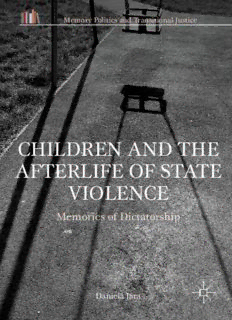
Children and the Afterlife of State Violence: Memories of Dictatorship PDF
Preview Children and the Afterlife of State Violence: Memories of Dictatorship
Memory Politics and Transitional Justice CHILDREN AND THE AFTERLIFE OF STATE VIOLENCE Memories of Dictatorship Daniela Jara Memory Politics and Transitional Justice Series Editors María Guadalupe Arenillas Northern Michigan University Marquette , USA Jonathan Allen Northern Michigan University Marquette, USA The last two decades of the twentieth century witnessed the rise of a novel idea the belief that an explicit confrontation with past injustices forms an essential component of commitment to constitutional democracy and the rule of law. This has had a widespread impact in transitional contexts across regions. It has also assumed a variety of political and cultural forms. The Memory Politics and Transitional Justice series publishes innovative new scholarship that confronts critical questions at the intersection of memory politics and transitional justice. The editors welcome submissions from a variety of disciplines. including political science and political theory, law, sociology, and cultural studies. More information about this series at http://www.springer.com/series/14807 Daniela Jara Children and the Afterlife of State Violence Memories of Dictatorship Daniela Jara Centro de Estudios de la Cohesión Social y el Confl icto COES Santiago, Chile Memory Politics and Transitional Justice ISBN 978-1-349-94852-9 ISBN 978-1-137-56328-6 (eBook) DOI 10.1057/978-1-137-56328-6 Library of Congress Control Number: 2016937725 © The Editor(s) (if applicable) and The Author(s) 2 016 This work is subject to copyright. All rights are solely and exclusively licensed by the Publisher, whether the whole or part of the material is concerned, specifi cally the rights of translation, reprinting, reuse of illustrations, recitation, broadcasting, reproduction on microfi lms or in any other physical way, and transmission or information storage and retrieval, electronic adaptation, computer software, or by similar or dissimilar methodology now known or hereafter developed. The use of general descriptive names, registered names, trademarks, service marks, etc. in this publication does not imply, even in the absence of a specifi c statement, that such names are exempt from the relevant protective laws and regulations and therefore free for general use. The use of general descriptive names, registered names, trademarks, service marks, etc. in this publication does not imply, even in the absence of a specifi c statement, that such names are exempt from the relevant protective laws and regulations and therefore free for general use. Cover illustration: © Gary Roebuck / Alamy Stock Photo Printed on acid-free paper This Palgrave Macmillan imprint is published by Springer Nature The registered company is Nature America Inc. New York To my grandfather, who taught me the art of storytelling from early childhood and because it was through his working-class history that I learned, fi rst-hand, about social class, familial political memory, and state violence. C ONTENTS 1 When the Past Matters 1 2 The Culture of Fear and Its Afterlife 37 3 Political Stigmas and Family Legacies 6 1 4 Family Memory and the Intergenerational Remembering of Political Violence 8 9 5 Family Countermemories 117 6 Concluding Remarks 149 Index 1 67 vii P REFACE In 1973, the three-year-long socialist government of Salvador Allende was abruptly interrupted by a military coup, which was the prelude to 17 years of dictatorship in Chile. On 11 September, La Moneda Palace was bombed by a section of the army which considered that the country was on the verge of a civil war. Public activities were forbidden, unions were dismantled, and a politics of fear was put into practice. After the coup, a neoliberal regime was installed which had a deep impact on Chilean cul- ture and the local regimes of memory. It was a time of persecution, death, unemployment, and exile for some, but a time of order, stability, privatiza- tion, and enrichment for others. I was born in 1978, during Pinochet’s regime of fear. I remember my childhood: I believed there were prehistoric animals hidden under the car- pet, fl uorescent spiders creeping along the walls at night, and giant insects living in the garden. Although those fantasies were part of my daily life, I never talked about them to anyone, not even my parents. I was a child with a strong sense of privacy. As a child of opponents of an authoritarian regime, I was aware of a radical distinction between inside and outside, between privacy and social relationships, between home, neighborhood, and school. At home, we were allowed to do things that outside home we could not do; there were family stories that could only be told at home. I always knew it was a secret that my parents had been members of the Communist Party before the coup and that my father went into clandes- tinity for months. The story of my grandfather’s kidnapping by the secret police and his experience of being tortured was never told to anyone, to the extent that it still sounds like a fi ctional memory to me. Despite the ix
Description: